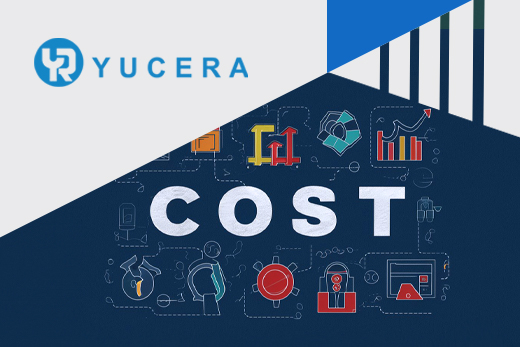How long do zirconia all-ceramic dental crowns last ?
2024-09-20
2024-07-07
Understanding Dental Milling Machine Prices: Comparing Different Types and Uses
Introduction
In the ever-evolving field of dental technology, dental milling machines have become indispensable tools for dental practices and laboratories. These machines play a vital role in the fabrication of dental restorations, including crowns, bridges, and dentures, by precisely milling materials such as ceramics and metals to create high-quality dental prosthetics. However, with the range of options available, navigating the market and understanding the prices can be daunting. This article aims to provide a comprehensive overview of dental milling machine prices, focusing on the different types available and their respective uses.
Type Classification
The price of a dental milling machine can vary widely depending on its type. Here, we'll explore the three primary types of dental milling machines and their price ranges:

Dry Milling Machines
Dry milling machines are designed to mill materials without the use of coolant. These machines are typically used for processing materials like zirconia, PMMA, and wax. The absence of coolant systems makes dry milling machines more straightforward in design and often more affordable. However, they are generally limited to specific materials that do not require lubrication during the milling process.
Price Range: The cost of dry milling machines usually starts at around $30,000 and can go up to $60,000 or more, depending on the brand, specifications, and additional features.
Wet Milling Machines
Wet milling machines, on the other hand, use a liquid coolant to reduce friction and heat during the milling process. This type of milling is suitable for a broader range of materials, including metals and ceramics, which require a cooler environment to prevent damage and achieve precise results. Due to the added complexity of the coolant system, wet milling machines tend to be more expensive than their dry counterparts.
Price Range: Wet milling machines typically range from $40,000 to $80,000, with high-end models potentially exceeding this range.
Hybrid Milling Machines
Hybrid milling machines offer the best of both worlds by combining the capabilities of dry and wet milling. These versatile machines can switch between dry and wet modes, allowing dental professionals to work with a wide variety of materials without needing multiple machines. As expected, the added flexibility and functionality come at a higher cost.
Price Range: Hybrid milling machines usually fall within the $60,000 to $100,000 range, with some advanced models reaching even higher price points.
Uses and Prices
The intended use of a dental milling machine significantly influences its price. Dental professionals should consider the specific applications they need the machine for to ensure they choose the most cost-effective option.
Crowns
Crowns are one of the most common dental restorations. They require high precision and the ability to mill hard materials like zirconia and ceramic. Wet milling machines are often preferred for their ability to handle these materials effectively.
Price Impact: Machines designed for milling crowns will generally be on the higher end of the price spectrum, with costs often ranging from $50,000 to $80,000.
Bridges
Like crowns, dental bridges require precise milling of durable materials. However, bridges can be more complex due to their larger size and the need to fit multiple teeth.
Price Impact: Milling machines suitable for bridges tend to be more specialized and may also fall within the $50,000 to $80,000 range, depending on their capabilities.
Dentures
Milling dentures often involves working with materials like PMMA. Dry milling machines are generally suitable for this purpose, making them a cost-effective choice for milling dentures.
Price Impact: Dry milling machines for dentures can be found in the lower price range, typically from $30,000 to $50,000.
Inlays and Onlays
These smaller restorations require precise milling of materials like ceramics and composites. A hybrid milling machine might be ideal due to its versatility in handling different materials.
Price Impact: Machines for inlays and onlays may vary widely in price, from $40,000 to $90,000, depending on their features and capabilities.
Implants
Milling machines designed for dental implants require high precision and the ability to mill both metal and ceramic materials. Hybrid machines are often preferred for this purpose.
Price Impact: The price for milling machines suitable for implants generally ranges from $60,000 to $100,000.
Pros and Cons Analysis
Selecting the right dental milling machine requires a clear understanding of the advantages and disadvantages of each type. Below, we break down the pros and cons of dry, wet, and hybrid milling machines to aid in your decision-making process.
Dry Milling Machines
Pros:
Cost-Effective: Generally less expensive than wet and hybrid machines.
Low Maintenance: Without a coolant system, maintenance is typically simpler and less costly.
Simplicity: Easier to operate due to fewer components.
Cons:
Material Limitations: Restricted to materials that do not require lubrication, such as zirconia and PMMA.
Heat Generation: Can generate more heat, which may affect precision and material properties.
Wet Milling Machines
Pros:
Material Versatility: Can mill a wide range of materials, including metals and ceramics.
Precision: Coolant reduces friction and heat, allowing for more precise milling.
Durability: Less wear and tear on the machine due to the cooling effect of the liquid.
Cons:
Higher Cost: More expensive upfront and may have higher maintenance costs due to the coolant system.
Complexity: More components can make operation and maintenance more challenging.
Hybrid Milling Machines
Pros:
Flexibility: Can switch between dry and wet milling, offering the versatility to handle a broader range of materials.
Comprehensive Capability: Ideal for practices that require the ability to produce diverse dental restorations.
Time-Efficient: Reduces the need for multiple machines, saving space and potentially reducing workflow interruptions.
Cons:
High Cost: Generally the most expensive type of milling machine.
By understanding the pros and cons of each type of dental milling machine, dental professionals can make moreMaintenance: More complex systems may require more frequent and specialized maintenance.
Learning Curve: Operating both dry and wet milling modes can be more complex and may require additional training.
informed decisions that align with their specific needs and budget constraints.

Conclusion
Choosing the right dental milling machine is a critical investment for any dental practice or laboratory. By understanding the different types of machines—dry, wet, and hybrid—and their associated price ranges, dental professionals can better assess which machine is most suitable for their specific applications. Consideration of the intended use, material capabilities, and the pros and cons of each type will ensure a balanced decision that meets both functional needs and budgetary constraints.